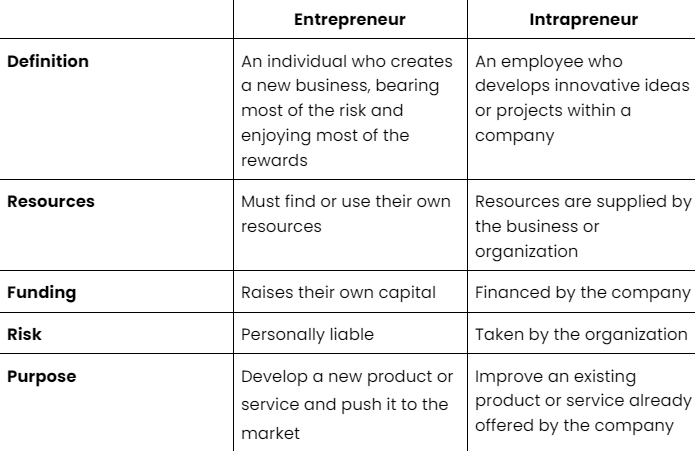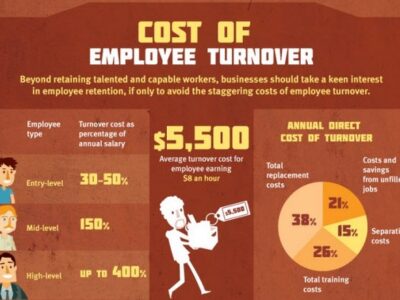You may already be familiar with the concept of an entrepreneur, but an intrapreneur is a less well-known term. While there’s a minor difference in spelling between the two terms, the difference in meaning is much more significant.
In this blog, we will explore what intrapreneurship is and present inspiring examples of how it can foster internal innovation and lead to tangible growth.
What Is Intrapreneurship?
Intrapreneurs are employees who are incentivized to use company resources to develop innovative ideas and projects within a company. While intrapreneurs are often overlooked within the realm of entrepreneurship, supporting internal innovation can be disruptive and bring about big change for a business.
Intrapreneurship combines the best of both worlds. They have the autonomy and resources to pursue innovative projects and ideas without the financial risk of failure.
Entrepreneurship Vs. Intrapreneurship
Even though intrapreneurs are similar to entrepreneurs, there are some key differences to consider:
How Does Employee Intrapreneurship Work?
Implementing an intrapreneurial model doesn’t happen overnight. To create a successful intrapreneurship program within your organization, fundamental and conscious change at many levels of the organization is required.
Here are some of the most effective ways to support intrapreneurship in your organization.
- At a strategic level: Intrapreneurship requires support from the top. It must start with organizational leadership making a strategic decision to support and foster internal intrapreneurs with their business. They must commit to giving intrapreneurial employees the time, autonomy, and resources needed to develop new products and services or enhance the existing ones.
- At a departmental level: Developing intrapreneurship starts with identifying those individuals within the organization who already have an entrepreneurial mindset and supporting them on a separate learning and development journey. Rather than following the traditional development paths, these employees should be allowed to develop in separate streams specially designed for intrapreneurs.
- At a managerial level: To encourage intrapreneurship, managers have to be more flexible with employees, allowing them to bend the rules that serve as barriers to innovation. This can be the area of highest risk to organizations.
- At an individual level: High potential employees should be tasked with solving current challenges that the business faces. This allows them to work on solutions that are strategically aligned with business goals. Once the challenge has been presented, employees should be left to work autonomously on the solution and its implementation.
The Importance of Supporting Internal Innovation
Technological advancements are pushing organizations to innovate continuously to remain competitive. This can be seen in the current composition of Fortune 500 companies. Only 22% of companies on the 2015 Fortune 500 remain on that list today. The other 88% have been acquired, merged, or, in most cases, just lost relevance.
Supporting internal innovation is an important part of remaining competitive. Employees possess a deep knowledge of products, processes, and culture which makes them well-equipped at finding innovations that can bring tangible results.
A culture of internal innovation brings about other business benefits, such as:
- Attract high-quality talent: Showcasing the success of intrapreneurs within your organization will help attract high-quality talent to wish to use their entrepreneurial mindset within an established business.
- Boost employee motivation: Talented intrapreneurs will form productive and highly engaged teams to help them develop their ideas and bring them to life. As success stories emerge, employees will feel more motivated to be involved in these projects and contribute their own ideas and creativity.
- Remain competitive: Intrapreneurs usually don’t over-engineer and they don’t hang around. They like to develop and test their ideas as quickly as possible to find out what works and doesn’t. You can use this speed to push new products and services to market faster and take the first mover advantage.
3 Inspiring Employee Intrapreneurship Examples
With so many examples of successful intrapreneurship, it’s hard to pick favorites, but if you’re wondering how impactful intrapreneurship can be, here’s a collection of three great stories from some of the biggest intrapreneurs
Blowing Competitors Out of the Water – Gmail by Google
Gmail is one of many shining examples of Google’s ability to foster internal innovation. Their legendary 20% time policy (which permits employees to spend 20% of their time on personal projects) allowed employee Paul Buchheit to create Gmail. Today, Gmail has more than 1.5 billion global active users, it has gone from a small project to, arguably, one of the most important offerings of the entire Google Suite.
Playing with New Products – Playstation by Sony
Ken Kutaragi was a forward-thinking employee at Sony when he had the idea of expanding Sony’s services into the gaming market. Something his executives weren’t initially interested in. After receiving backing from the CEO, Kutaragi was eventually allowed to work on the development of Sony’s first gaming console, the Playstation.
Ken Kutaragi eventually went on to become chairman and CEO of Sony Interactive Entertainment. In 2021, games and network services represented the highest share of the revenue for Sony corporation, totaling 29% of its entire revenue.
Reaching Into New Markets – Flamin’ Hot Cheetos by Frito-Lay
Probably one of the most inspiring examples of intrapreneurship that came from the most unlikely of places. Frito-Lay employee Richard Montañez noticed a gap in the crisp market for a product that catered to Latino taste buds. He grabbed some unseasoned Cheetos and took them home to be seasoned with his homemade spice mix.
After bagging them up, complete with hand-drawn logos, he presented them to the board, who were more than impressed. Richard Montañez left his job that day as the company janitor and became the VP of MultiCultural Sales and Community Promotions. Flamin’ Hot Cheetos was one of Frito-Lay’s most successful launches of all time.
Foster a Culture of Internal Innovation
A culture of internal innovation doesn’t just happen by accident. It takes a conscious effort from management to create an environment where employees’ ideas can thrive. TeamBonding specializes in curating events that engage, connect and inspire employees and their teams – in person, online, or both.
Get your team’s creative juices flowing with City Build. A fun, memorable experience that emphasizes strong team dynamics and group-wide collaboration. An engaging hands-on activity that tasks your group with designing and building a miniature urban landscape out of commonly available materials.
Or why not put your employees’ decision-making skills to the test with Leadership Stories? This engaging event is designed specifically to cultivate your team’s leadership skills. Competing as teams, your team will have to consider a series of scenarios that require smart leadership decisions.
Take the Next Step Toward Supporting Intrapreneurship
Building a strong culture of internal innovation within your organization can help you attract better talent and improve business results. This can also give you a competitive advantage in the long run.
Team building events complement these benefits and can help organizations improve the overall company culture. Reach out to TeamBonding to explore custom team building activities or browse our growing list of interactive and engaging events.

















